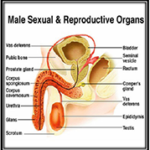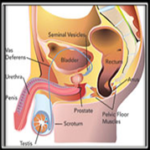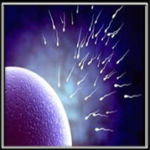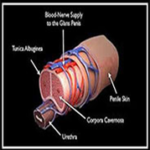Testosterone and Sex Hormone Binding Globulin – An overview and Importance
Testosterone is the hormone that gives men their manliness. Produced by the testicles, it is responsible for male characteristics like a deep voice, muscular build, and facial hair. Testosterone also fosters the production of red blood cells, boosts mood, keeps bones strong, and aids thinking ability. In adulthood, it keeps men’s muscles and bones strong and maintains their interest in sex. In short, it’s what makes a man a man (at least physically). And helps make sperm.
The pituitary gland in your brain controls the amount of testosterone your body makes.
Women’s ovaries also make small amounts of testosterone. It helps many organs and body processes in women.
After age 30, most men begin to experience a gradual decline in testosterone. A decrease in sex drive sometimes accompanies the drop in testosterone, leading many men to mistakenly believe that their loss of interest in sex is simply due to getting older.
If your healthcare provider thinks that you have low or high testosterone, your total testosterone levels will be checked first.
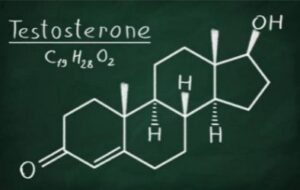
Testosterone Level Test-
This test measures the levels of testosterone in your blood. Testosterone levels that are too low (low T) or too high (high T) can cause health problems in both men and women. Other names are serum testosterone, total testosterone, free testosterone, bioavailable testosterone. Most of the testosterone in the blood is attached to proteins. Testosterone that is not attached to a protein is called free testosterone. There are two main types of testosterone tests:
There are two main types of testosterone tests:
- Total testosterone, which measures both attached and free testosterone.
- Free testosterone, which measures just free testosterone. Free testosterone can give more information about certain medical conditions
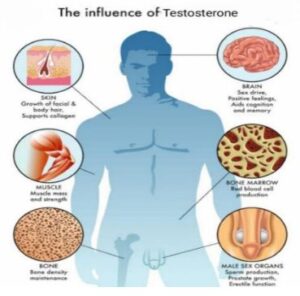
Indications for testosterone level test- A testosterone levels test may be used to diagnose several conditions, including:
- Decreased sex drive in men and women
- Infertility in men and women
- Tumors of testicles in men
- Early or delayed puberty in boys
- Excess body hair growth and development of masculine features in women
- Irregular menstrual periods in women
Symptoms of low and high testosterone- You may need this test if you have symptoms of abnormal testosterone levels. For adult men, it’s mostly ordered if there are symptoms of low T levels. For women, it’s mostly ordered if there are symptoms of high T levels.
Symptoms of low testosterone levels in men include:
- Low sex drive
- Difficulty getting an erection
- Development of breast tissue
- Fertility problems
- Hair loss
- Weak bones
- Loss of muscle mass
Symptoms of high testosterone levels in women include:
- Excess body and facial hair growth
- Deepening of voice
- Menstrual irregularities
- Acne
- Weight gain
Boys may also need a testosterone levels test. In boys, delayed puberty can be a symptom of low testosterone, while early puberty may be a symptom of high testosterone.
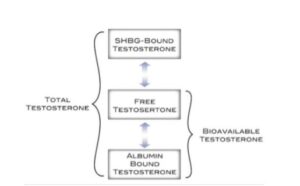
Free Testosterone- They don’t attach to other proteins, this type of bioavailable testosterone can be used up by the body. The body actively uses free T molecules since they are at liberty to enter the body’s cells, unimpeded by SHBG or albumin, to carry out their function as signaling molecules that regulate metabolism and other cellular functions. (Testosterone molecules that are bound to other proteins cannot enter most of your cells.)
Total Testosterone- The total testosterone level is a measure of the testosterone concentration you have in your blood in total—both free and bound. Most of the testosterone in the blood attaches to 2 proteins: albumin and sex hormone binding globulin (SHBG). Some testosterone is not attached to proteins. This testosterone is called free testosterone. All these are considered in total testosterone.

Free Testosterone vs total Testosterone- According to some research, free testosterone levels are a better predictor of testosterone deficiency symptoms than levels of total testosterone are. Moreover low levels of total testosterone don’t necessarily point to a testosterone-related health issue, since this might be simply a “side effect” of something else going on in your body like obesity can lead to a decrease in total testosterone levels since insulin resistance; lowers SHBG levels, causing total testosterone levels to drop, as well. However, in a scenario like this, free testosterone is often not affected and remains at a normal level.
So low total testosterone levels tell you that something might not be quite right with your body’s androgen hormone production, low levels of free testosterone can help you pinpoint a possible cause of symptoms.
Treatment-
- Men who are diagnosed with low testosterone levels may benefit from testosterone supplements, as prescribed by their health care provider. Testosterone supplements are not recommended for men with normal T levels. There is no proof they provide any benefits, and in fact they may be harmful to healthy men.
- Skin patch. A patch is applied once every 24 hours, in the evening, and releases small amounts of the hormone into the skin.
- Gels. Topical gels are spread daily onto the skin over both upper arms, shoulders, or thighs. It is important to wash your hands after applying and to cover the treated area with clothing to prevent exposing others to testosterone.
- Oral therapy. Capsules are swallowed or tablets are attached to your gum or inner cheek twice a day. Testosterone is then absorbed into the bloodstream.
- Pellets. These are implanted under the skin, usually around the hips or buttocks, and slowly release testosterone. They are replaced every three to six months.
- Injections. Various formulations are injected every seven to 14 days. Testosterone levels can rise to high levels for a few days after the injection and then slowly come down, which can cause a roller-coaster effect, where mood and energy levels spike before trailing off.
Most men feel improvement in symptoms within four to six weeks of taking testosterone replacement therapy, although changes like increases in muscle mass may take from three to six months.
B) Treatment for high testosterone depends on the cause, but generally includes medication or lifestyle changes. Medications used to treat high testosterone include:
- glucocorticosteroids.
- metformin.
- oral contraceptives.
- spironolactone.
The test results mean- Test results may vary depending on your age, gender, health history, the method used for the test, and other things. The test results may not mean you have a problem. Ask your healthcare provider what your test results mean for you for better diagnosis.

Sex Hormone Binding Globulin (SHBG) Test:
Sex hormone binding globulin (SHBG) is a protein that affects the function of some sex hormones, including testosterone and estrogen. It is primarily made in the liver. In short, SHBG binds to specific sex hormones, removing them from direct circulation in the body.
The main functions of SHBG include:
- Controlling the availability of sex hormones
- Transporting sex hormones through blood
An SHBG test is most often used to find out how much testosterone is going to the body’s tissues. Sometimes a total testosterone test is enough to make a diagnosis. But some people have symptoms of too much or too little of the hormone that the total testosterone test results can’t explain. In these cases, an SHBG test may be ordered to provide more information about how much testosterone is available to the body.
Indication for SHBG Test- You may need this test if you have symptoms of abnormal testosterone levels, especially if a total testosterone test can’t explain your symptoms. For men, it’s mostly ordered if there are symptoms of low testosterone levels. For women, it’s mostly ordered if there are symptoms of high testosterone levels.
Free testosterone levels can be indirectly calculated using SHBG by assuming that 44 – 65% of testosterone is bound to SHBG and 33 – 50% to albumin in men, while 66 – 78% is bound to SHBG and 20 – 30% to albumin in women. Free testosterone levels reflect the availability of this hormone more accurately than the total testosterone concentration.
Additionally, SHBG levels can be used as a marker of conditions such as:
- Thyroid disorders
- Pituitary gland disorders
- Polycystic ovarian syndrome (PCOS)
- Insulin resistance
- Metabolic syndrome
- Androgen receptor disorders
- Eating disorders
Additionally, SHBG levels can be used as a marker of conditions such as:
- Thyroid disorders
- Pituitary gland disorders
- Polycystic ovarian syndrome (PCOS)
- Insulin resistance
- Metabolic syndrome
- Androgen receptor disorders
- Eating disorders
Normal Ranges
- Men: 10 – 57 nmol/L
- Women: 18 – 144 nmol/L
Symptoms of High SHBG Levels- Symptoms of high SHBG are similar to those of low male sex hormone levels.
In men, they include:
- Arrested sexual development (in teenagers)
- Infertility
- Decreased sperm concentration and motility
- Decreased sex drive
- Impotence
- Reduced testicle size
- Breast growth
- Decreased body hair
- Hot flashes
- Reduced bone and muscle mass
- Decreased energy and motivation
In women, high SHBG levels may cause:
- Decreased sex drive
- Irregular or absent periods
- Vaginal dryness
- Reduced bone and muscle mass
- Memory losses
- Depression and anxiety
- Tiredness/ Reduced wellbeing
Symptoms of low sex hormone binding globulin: It is similar to those of excessive male sex hormone levels.
In females, they include:
- Excessive body hair/male-pattern hair growth (hirsutism)
- Acne
- Dandruff
- Baldness
- Voice deepening
- Increased muscle mass
- Reduced breast size
- Irregular or absent periods
- Enlargement of the clitoris
- Weight gain
Though rare, low SHBG in males may cause:
- Early puberty (in children)
- Acne
- Baldness
- Increased body hair
- Aggression
- Erectile dysfunction
- Gynecomastia (breast growth)
- Infertility
Low SHBG increases available testosterone and produces the symptoms of high testosterone in women and girls, including male-pattern body hair growth, acne, voice deepening, and irregular or absent periods.
Testosterone test vs SHBG Test- A total testosterone test does not distinguish between bound and unbound testosterone but determines the overall level of testosterone in the plasma. In many cases, this test is sufficient to evaluate patients for excess or deficient testosterone production. However, if your SHBG level is not normal, then the total testosterone may not be an accurate representation of the amount of testosterone that is available to your tissues. An SHBG test may be performed when your signs and symptoms do not correlate with the results of a total testosterone test.
Treatment-
A) High SHBG- SHBG reduces testosterone availability. Because testosterone can increase athletic performance and does lower naturally with age, some people may want to lower their SHBG levels. Again, it is important to speak with your doctor before attempting any lifestyle or supplement regimen changes aimed at lowering SHBG levels.
- Dietary Changes- High-protein diets were associated with reduced blood SHBG levels in a study on over 1,500 men.
- Supplements- The following supplements were found to decrease SHBG production and/or reduce its interaction with sex hormones, though further clinical studies are needed before these findings can be considered conclusive:
- Boron
- Magnesium
- Calcium
- Zinc
- Vitamin D
- Fish oil (or any other polyunsaturated fatty acid supplements)
- Tongkat Ali
B) Low SHBG- If the increase of SHBG caused by the medication is resulting in hormone imbalances, then mental health and mood related issues can further negatively affected.
Medications that Increase SHBG
- Antipsychotics (typical and atypical)
- Antidepressants (SSRI’s, Tricyclics, MAOI inhibitors)
- Xanax.
- Tamoxifen.
- Spironolactone.
- H2 Antagonists.
- Metformin.
- Oral contraceptives (birth control pills)
Conclusion- SHBG can be affected by many hormone pathways in the body. In turn, SHBG levels affect the bioavailability of sex hormones such as testosterone and estrogen. Checking your lab values may help your doctor rule out some serious illnesses, but it can also give them a bigger picture of your hormone health.

